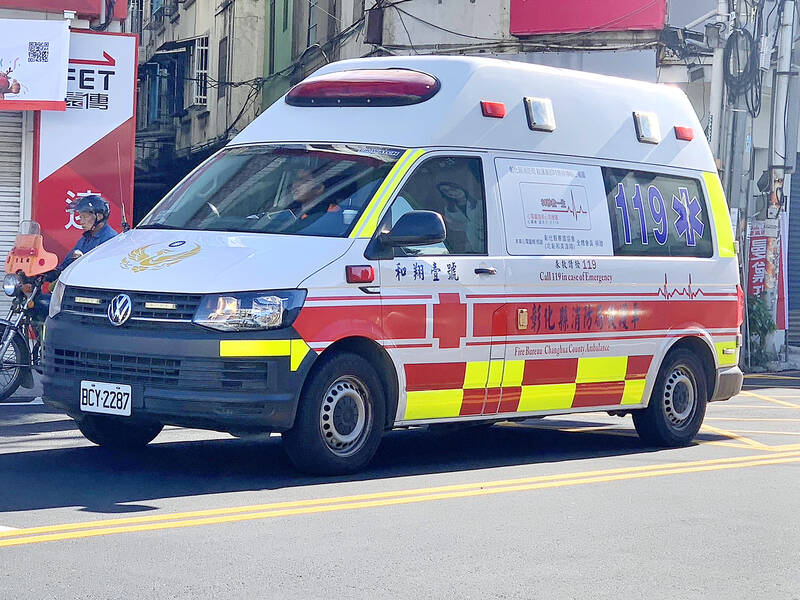Tiered fees for ambulances should be introduced to prevent their misuse, the Legislative Research Bureau said in a recent report.
Ambulances operated by fire departments across Taiwan were requested by members of the public 206 times over the past 10 months, and in many of those cases they were unnecessary, the report said.
That is an ambulance called once every 1.5 days, which raises concerns about the misuse of medical resources, it said.

Photo: Tang Shih-ming
The report called for amendments to the Charge and Fees Act (規費法), as well as Article 20 of the Emergency Medical Services Act (緊急醫療救護法), to “create standards for all local governments to follow,” and to implement reminders, late-payment penalties and other stipulations related to ambulance fees.
Currently, only some cities and counties collect fees for public ambulance use.
Misuse of fire department ambulances would be an issue because the departments need ambulances available to deploy when responding to emergencies, the report said, citing a 15.8 percent increase in such deployments over the past five years.
Nationwide, fire departments sent out ambulances about 1.3 million times in 2022, accounting for an average of 3,582 dispatches per day.
As those dispatches relied on the use of a total of 1,281 ambulances at fire departments nationwide, the ambulances were already being put to heavy use serving the departments’ needs, the report said.
“People have the right to use public property for legitimate purposes, and there should be no doubt that fire department ambulances are public property,” it said.
“However, there are limited resources available, and it is therefore reasonable to collect fees from those misusing those resources,” it said.
Localities that charged for public ambulance use had a lower rate of repeated use by individuals, the report said.
However, current laws do not stipulate penalties or increased fees for those who misuse public resources, and do not outline measures for those who do not pay fees, it said.
“Amendments would empower local governments to tackle resource misuse and enforce collection of fees and implementation of penalties,” it said.
“A tiered fee system would also help deter repeated use of precious resources while not penalizing those with legitimate use cases.”

Eight restaurants in Taiwan yesterday secured a one-star rating from the Michelin Guide Taiwan for the first time, while three one-star restaurants from last year’s edition were promoted to two stars. Forty-three restaurants were awarded one star this year, including 34 in Taipei, five in Taichung and four in Kaohsiung. Hosu (好嶼), Chuan Ya (川雅), Sushi Kajin (鮨嘉仁), aMaze (心宴), La Vie by Thomas Buhner, Yuan Yi (元一) and Frassi in Taipei and Front House (方蒔) in Kaohsiung received a one-star rating for the first time. Hosu is known for innovative Taiwanese dishes, while Chuan Ya serves Sichuan cuisine and aMaze specializes

Taitung County is to launch charter flights to Malaysia at the end of this year, after setting up flights to Vietnam and Thailand, the Taitung County Government said yesterday. The new charter flight services, provided by low-cost carrier Batik Air Malaysia, would be part of five-day tour packages for visits to Taitung County or Malaysia. The Batik Air charter flight, with about 200 seats, would take Malaysian tourists to Taitung on Dec. 30 and then at 12:35pm return to Kuala Lumpur with Taiwanese tourists. Another charter flight would bring the Taiwanese home on Jan. 3 next year, arriving at 5:30pm, before taking the

Taiwan High Speed Rail Corp. (THSRC) plans to ease strained capacity during peak hours by introducing new fare rules restricting passengers traveling without reserved seats in 2026, company Chairman Shih Che (史哲) said Wednesday. THSRC needs to tackle its capacity issue because there have been several occasions where passengers holding tickets with reserved seats did not make it onto their train in stations packed with individuals traveling without a reserved seat, Shih told reporters in a joint interview in Taipei. Non-reserved seats allow travelers maximum flexibility, but it has led to issues relating to quality of service and safety concerns, especially during

An exhibition celebrating Taiwan and Japan’s comic culture opened on Saturday in Taichung, featuring a section that explores Taiwanese reproductions of Japanese comics from when martial law limited Japanese representation. “A Century of Manga Culture: An Encounter of Taiwan and Japan’s Youth” held its Taiwan opening ceremony at Taichung’s National Taiwan Museum of Comics after an initial one-month run in Japan’s Kyoto International Manga Museum between May 24 and June 24. Much like the Kyoto exhibition, the show mainly celebrates the comic connection between Taiwan and Japan through late Taiwanese comic book